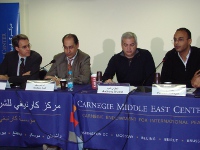Registration
You will receive an email confirming your registration.
Protesters, angry at the slow pace of reforms, are back in Tahrir Square demanding the end of military rule. The ruling generals are reluctant to hand over power and are detaining activists and protesters who challenge their rule. Copts are feeling increasingly marginalized, and women worry about their future as the influence of Salafist groups increases.
Hossam Bahgat, founder and director of the Egyptian Initiative for Personal Rights, Kenneth Roth, executive director of Human Rights Watch, and Anthony Shadid, the Beirut bureau chief of the New York Times, discussed the challenges and prospects of Egypt’s current transition and its future. Carnegie’s Ibrahim Saif moderated.
Transition to Democracy?
According to Bahgat, the main problem with Egypt’s transition is that it has yet to begin. Reforms have yet to be implemented across a number of sectors, and the goals of ending police brutality, torture, military trials for civilians, and violence against protestors remain unfulfilled. Bahgat emphasized three areas that particularly require reform:
- Security Sector: In particular, the Interior Ministry, which was the most abusive instrument under Mubarak’s regime, has to be restructured, he argued.
- Social and Economic Sector: Past policies which led to many social and economic injustices have still not been changed, including subsidies for highly profitable industries, Bahgat said. He added that no real measures had been taken to reduce poverty.
- Foreign Policy: Despite optimism when the government was appointed in March, there have been no changes to Egypt’s foreign policy, Bahgat said.
Role of the SCAF
Bahgat explained how perceptions of the Supreme Council of Armed Forces (SCAF) have changed since the start of the revolution:
- Benefit of the Doubt: At the height of the protests in February, the SCAF was seen positively for unseating their commander in chief and not abusing protesters. Even when they began to assert more power, people still gave them the benefit of the doubt, blaming inexperience.
- Foreign Conspiracy: During the summer, the SCAF became convinced that there was a foreign conspiracy of external powers looking to destabilize Egypt, Bahgat said. They contended that the youth coalitions and independent media outlets in Egypt were serving this conspiracy. Bahgat argued that the SCAF and the military grew increasingly paranoid, convinced that they were the only true patriots.
- Different visions: Bahgat pointed out that some of these changing perceptions result from the fact that the people and the army had different reasons for opposing the Mubarak regime. While the people were advocating for economic and political reform, the army’s main concerns were Hosni Mubarak’s plans to pass the presidency on to his son and the financial corruption that allowed the business elite working with the state to embezzle state funds.
Key Players
- Military and SCAF: Their economic interest is to maintain the close relationship between the military and the state while also forming a government that is not too closely scrutinized, Roth said.
- Liberals: This group wants to set up constitutional rights to protect themselves from Islamists, but at the same time they are willing to work with the Islamists to diminish the power of the military, he said.
- Islamists: They are divided between the Salafis, who have a radical agenda, and the Muslim Brotherhood, who are more moderate, Roth explained.
Challenges of the Revolution
- Division of Power: There is a clear question about how power will be divided between a new, empowered parliament and the military, Shadid said.
- Channelling Tahrir Square: There is a lot of popular anger, especially toward the police after years of police brutality, Shadid said. The political class should understand what the public wants and deliver it in order to avoid ongoing conflict.
- The Salafis and the Muslim Brotherhood: There is some concern, both domestically and internationally, that the conservative Salafis will push the Muslim Brotherhood further to the right, Shadid added.
The Western Perspective
The West has a problem accepting the fact that Islamic parties are generally popular in Egypt, Roth said. He argued that even if such parties were democratically elected, the United States and Europe will likely have a hard time respecting the results of those elections. Their concern stems from two major sources: worries that an Islamist Egypt would pose a threat to Israel and concerns over how that affects the flow of oil to the west. Roth suggested that the West should respect the results of the Egyptian elections, whatever they may be, and should consider working with these Islamic parties.
A Positive Future
Although there are many obstacles to tackle, Egypt has shown signs of a positive future. Both Bahgat and Shadid stated that there is a new feeling of nationalism in Egypt, evidenced by the massive turnout during the elections. Furthermore, Shadid noted, there is debate between various political groups about how to tackle the country’s socioeconomic problems and improve living standards in Egypt. Although many obstacles stand in the way, the panelists agreed that this indicates that the region is definitely moving in the right direction.
